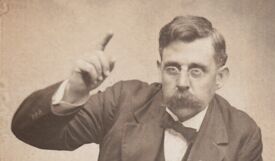
Harrison McCain in 1925.
Harrison McCain (April 2, 1897 - April 4, 1969) was a prominent Lovian philosopher, social activist, and the founder of the Lovian Philosophical Society. Harrison McCain was born to a poor Noble City family and attended Noble University, graduating at the top of his class, and majoring in philosophy.
Philosophical Career[]
Harrison McCain went on to study under analytical philosophers such as Bertrand Russell and G. E. Moore. Harrison went on to write five published works: Ethics (1919), Ethics and Equality (1920), Mathematical Philosophy and its Value (1923), Is War Ethical? (1930), and his magnum opus Why We Need Peace (1945)
His works were largely inspired by the western "revolt" against idealism and Bertrand Russell's pacifism. In his early two works on ethics he tackled capital punishment and utilitarian ethics. He states: "In a society we often find it hard to promote the greatest good...We should instead promote the least pain, it is the only way to create a working world." His third work tries to defend the way of knowing often promoted by the anyaltical school during the 1900s.
In 1924 Harrison McCain founded the Lovian Philosophical Society because he was one of Lovia's most well known philosophers at the time. He found the group to foster a love for philosophy, promote classes in schools, and allow a space for open debates. The first work the group discussed was his latest work Mathematical Philosophy and its Value. McCain took time off from his works and focused on the LPS and buying the Wisdom House for the group to have a permanent settlement. In his 1930 work Is War Ethical? he argued that "some bad may need to be done, in order to make sure a greater bad doesn't occur." He finished his career by writing a 300 page book Why We Need Peace after the end of WWII which argued for equality, world peace, and an end to superstitious fear.
McCain stepped down from being President of the Lovian Philosophical Society in 1955, serving 31 years the longest time for any President of the Society. The last act he passed was to limit the time a President could spend in office which is one, three year term. In 1959 Harrison McCain started having heart complications and died of a heart attack in 1969.